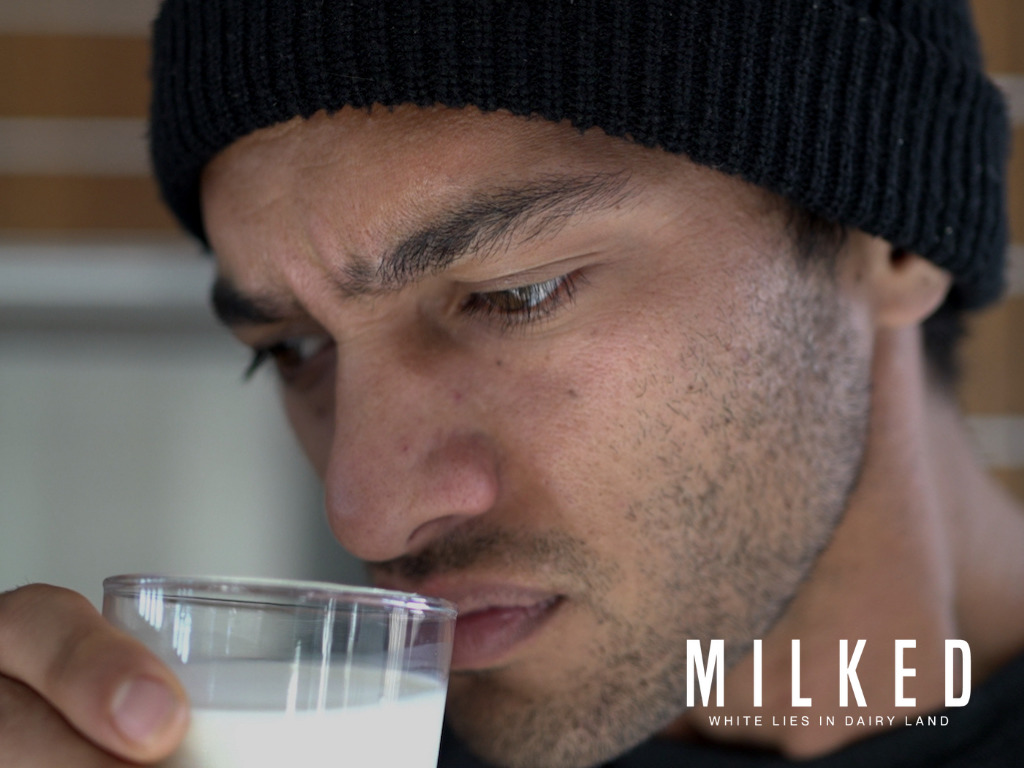‘We Need To Find Solutions That Work For Everyone’ – A Chat with Chris Huriwai and Amy Taylor of ‘Milked’ Documentary
10 Mins Read
Vegan Māori activist Chris Huriwai and director Amy Taylor talk about the film ‘Milked’ and how it exposes New Zealand’s multibillion-dollar dairy industry, the ongoing cover-up of its environmental and ethical track record. and where we go from here.
The New Zealand dairy industry is worth close to $8 billion. It is home to some of the world’s largest dairy companies. The documentary ‘Milked’, aims to help the public take a deeper look into a sector that is playing an increasingly big role in the climate crisis. Globally, the 13 largest dairy companies emit more GHH than the entire United Kingdom.
The film follows the journey of vegan Māori activist Chris Huriwai. Director James Cameron calls it ‘a powerful wake-up call’ and ‘Cowspiracy’ producer Kip Anderson describes it as “the film the dairy industry doesn’t want you to see”.
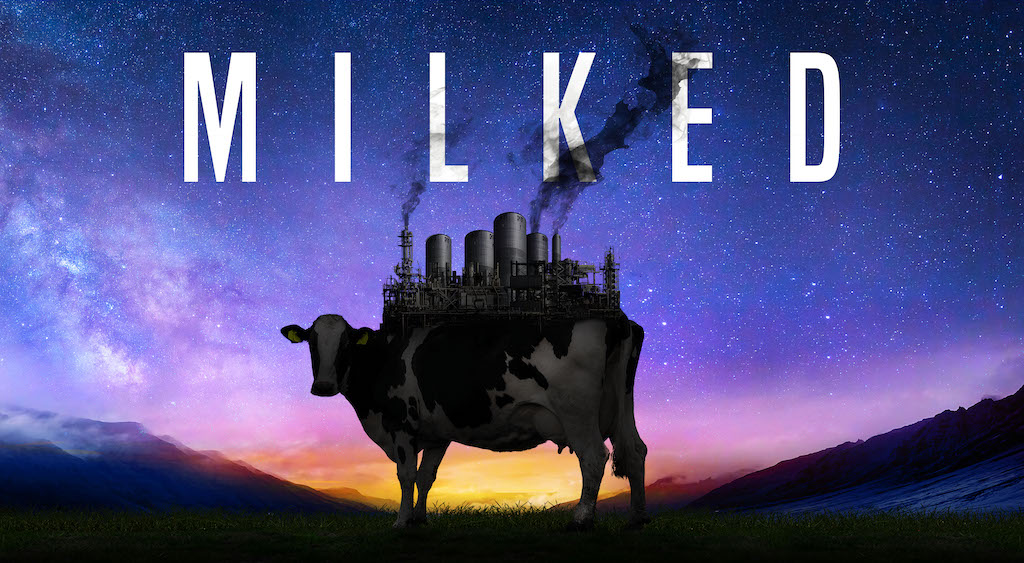
GQ: What triggered the making of this film? How did you end up on this journey?
CH: I played around with video editing when I was younger and became familiarized with those tools. When I began feeling the need to advocate for animals and the environment, I started embracing digital activism, mostly in the form of social media and creating videos about industry propaganda.
Then Amy from Ahimsa reached out to me, we worked together on a smaller project and talked vaguely for the need to have a local documentary similar to ‘Cowspiracy.’
What seemed like just an aspirational vision at the time piqued my interest so I couldn’t help but stoke the flames of the idea and Amy’s like me, ambitious, so once we started encouraging each other it just took off. Through my years of doing activism, dairy has stuck out as the common denominator when viewing issues from a birds-eye.
AT: I started off as a wildlife filmmaker, then began making short vegan-themed films about 4 years ago. In 2018 I made a film featuring Chris as an animal rights activist (The Cube of Truth) and that’s when we started kicking around the ideas that lead to making MILKED. We were both inspired by Cowspiracy and What the Health, so our goal was to make a sort of kiwi-blend of those documentaries, but focused on the dairy industry.
GQ: In the trailer, you say have been threatened during the making of this film: who is threatening you? Are you afraid of these threats?
CH: The power of the dairy industry and its effect on society can’t be understated. We’re talking about a powerful, billion-dollar, multi-national corporation, as well as everyday people’s livelihoods within a volatile system of crippling debt and other various, sensitive issues.
Many of the whistleblowers we interviewed for ‘Milked’ spoke about death threat experiences. We haven’t received anything yet, the trailer speaks about the potential threat and awareness around the need to prepare for the backlash. And given the nature of dairy farming in Aotearoa, we’re hoping that calling it out will help deter some of that behavior.
AT: So far we haven’t had any serious threats come our way, but based on other people’s experience making similar films (or working as activists or scientists) we’re aware that it’s likely we’ll get some threats directed at us once the film is released.
Keegan Kuhn (Cowspiracy co-director and one of our Executive Producers) advised us that one way to prepare for any backlash is to talk about it publicly, including having it in the film. It really is a powerful industry and we noticed how a lot of people were too scared to talk with us about certain things on camera. I do have some concern for my safety and my family’s safety, but we have to get this message out there and I’m hopeful that once people have seen the film they’ll know that we have good intentions – we’re not out to attack anyone, we just want to see some positive change.
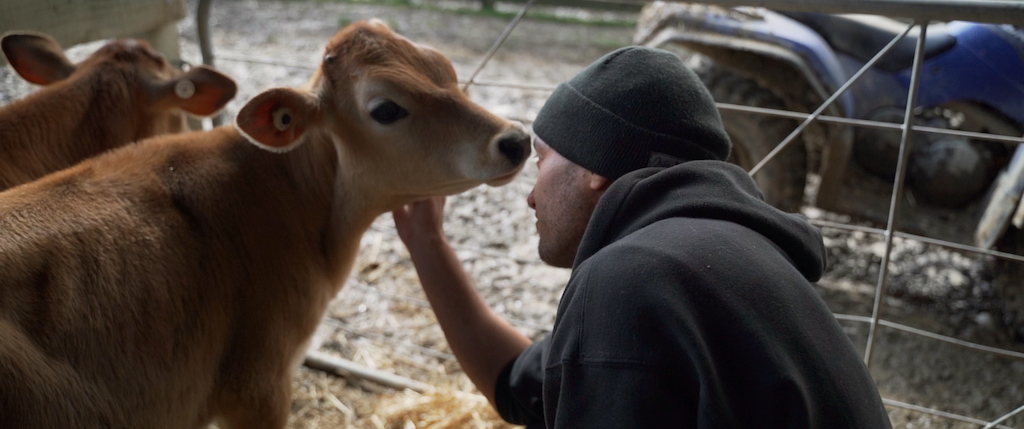
GQ: Where do we go from here? How should New Zealanders and the dairy industry as a whole work to fix the issues?
CH: We’re currently facing an onslaught of important issues, around the globe. All are worthy of focus and attention. However, and this is particularly for here in Aotearoa, my focus is on dairy because it’s an aspect of our society that blows out into so many different spheres, for a totally unnecessary product.
This gives us an enormous pool of advocates and activists to dip into to collectively work with towards a solution. Multiple ways to answer this, firstly for the industry itself… a switch to plant-based foods should be the first priority. But for the interim, they need to switch from being a low commodity food producer that aims to feed the world on an inherently unsustainable product, towards a high end, better return on investment product which markets itself to wealthy demographics instead of the developing world- which is currently embedding our diety failures onto others, most of whom are in a worse state economically than ourselves.
They’ll need to adopt this model to facilitate a sustainable shift towards a better product-preferably a plant-based product that will have a lower impact on the environment and avoid the ethics of exploiting an animal which the current and next-generation are turning their nose up to. But this is a problem the industrial complex will face on all fronts, as more jobs are automated and plant-based foods scale up I’d be lying if I said I believe all animal-based farmers will be able to continue producing food in a different way- thats a fairytale.
Like supermarket checkout operators and factory workers, likewise, farmers will find it harder and harder to compete in the business of producing food. Many will find themselves having to start new careers, it’ll be a race for early adopters to keep their role as food producers, those that lag behind will be left behind.
AT: We feel strongly that everyone has to work together for a better future for people, animals, and the planet – that means choosing plant-based alternatives, and helping farmers transition away from dairy and other animal agriculture as soon as possible. In many ways, they’ve been encouraged to get into intensive farming, and now they need help to get out of it. It doesn’t just affect us here in New Zealand either, most of what we cover in the film is relevant globally also.
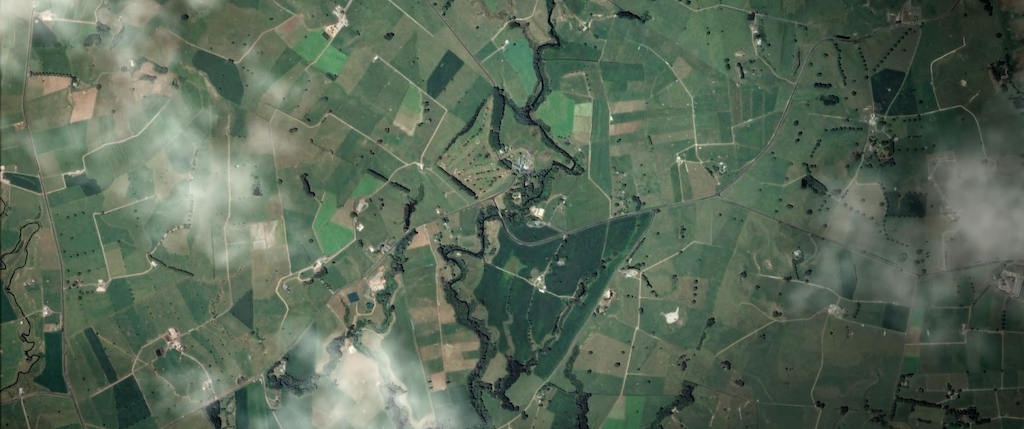
GQ: What is the biggest message you hope viewers will get from watching the film?
CH: Question society, the topics we touch on in the film are narratives and ideologies which have become so embedded into our psyche that they’re not considered unquestionable- they’re just facts we’re learning to live with apparently.
This is of course the root of many issues we face today, things get put in the too-hard basket, pushed to the side, until they become the burdening issue we can’t ignore- which is today’s modern dairy industry. All we’re trying to do is provide people with the alternative view in contrast to the industry which have clear vested interests.
Also, a big takeaway I’m hoping people resonate with, is the need to find solutions that work for everyone, we’re not out here trying to demonise farmers- they’re part of this system of abuse just like the rest of us. It’s not their fault they’re been lead to where they are by farming leadership- we need to support them, just like anyone else that needs to change.
AT: The main thing that I want people to know is that there’s so much destruction and devastation being caused for a product that we don’t need – something that actually does us harm. It’s true that our nation’s biggest industry is its biggest threat, and around the world there is no way we can feed the planet sustainably and ethically with animal agriculture.
When I drive through the countryside I see things differently now – I imagine all the native forest and wetlands that have disappeared, I see the cows in paddocks without their calves and with udders full of milk, and how they have to walk to a milking shed instead of nurturing their young. I’m haunted by the fact that 2 million newborn calves are killed in our country every year.
But ‘Milked’ is also solutions-focused; there are other many alternatives to dairy for consumers and for farmers, and it was so inspiring to meet farmers transitioning out of the industry, and see all the benefits that come from that.
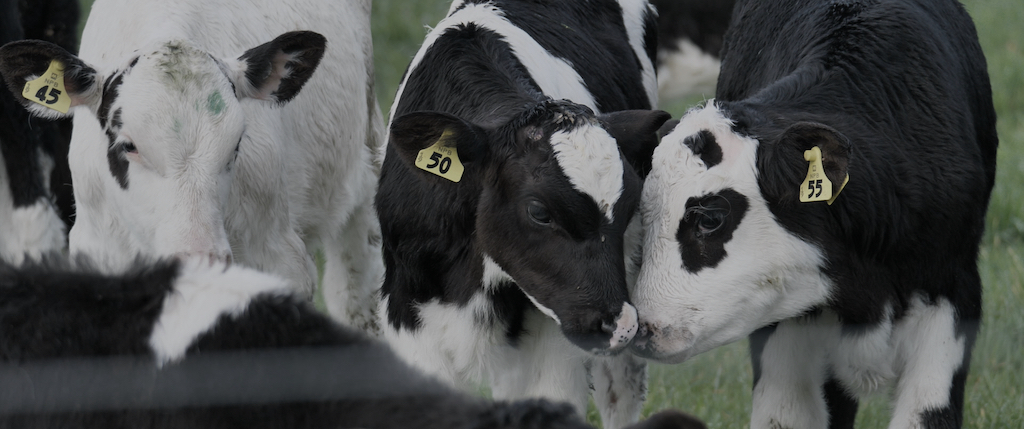
GQ: What was the hardest part about making this film? Can you share some of the biggest obstacles?
CH: For me, as things gained steam it became clear that we were being entrusted by a lot of incredible individuals to present their contribution to this film in a way that’s going to bring some positive change. I feel like we’ve been appointed to tell “this story”.
The story of how dairy has become a harmful part of our society and that we need to communicate it in a way that resonates with people- there’s a lot of cognitive dissonances and embedded narratives to work through, so the pressure to get it right feels heavy.
I feel the opportunity has presented itself to tell the story, but there might not be time to retell it if we fail… Considering such a film could have an impact on the climate breakdown, the treatment of animals, the way we relate to the natural world… and that we’re talking about peoples livelihoods and ways of life… When you think about how radically and disruptive or life-changing such a message could be for wide demographics of people, the pressure gets real!
AT: We started off with a really small production budget, so it was just me as a one-person film crew (camera, sound, producer/director). That wasn’t easy but it did keep things simpler and more affordable.
It was frustrating that no one from the industry leaders at Fonterra or Dairy NZ would do an interview, but in the end their refusal to meet with us says everything really – they’re very good at projecting an image, but not so good at being honest.
The research involved in making the film was massive (thanks to Nicky Taylor and Nicholas Carter for helping us with that!) and editing was a challenge – making sure it’s an eye-opening and entertaining story as well as being information-rich.
With over 100 hours of interviews, we had to cut a few people out completely which was really hard to do, but we’re hoping to make some extra content when we can. We also made a decision early on that we wouldn’t include graphic footage that might put people off watching the film, so we had to get the right balance. We want to appeal to a mainstream audience, but we also don’t want to ignore the animal suffering part of the story either, and it’s important people understand the basics of what happens on dairy farms.
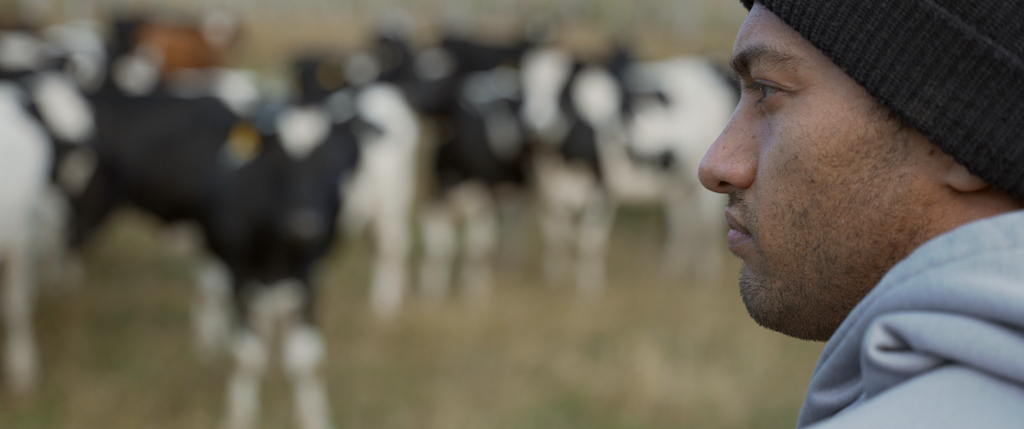
GQ: What was the most rewarding part of making the film?
CH: The best part of making the film was touching base with other advocates in this space, when you’re at the frontline with all these incredible individuals it fills you up with what you need to continue as an activist.
And knowing that we’ve produced something helpful for others, it’s a great feeling knowing that others will lean on this body of work for their own advocacy. That this body of work will help fill others up with what they need to continue their important work, whether it be for the environment, for animals or our fellow humans- there’s something in this documentary for them all.
AT: It’s been so incredible how much support we’ve had, especially from our Executive Producers, Keegan Kuhn, Suzy Amis Cameron, and Peter Eastwood from the Tanglewood Foundation. There have been so many people who have helped along the way and are still helping us get this message out now.
Also I had moments in the editing process when I realised that what we’ve been working on for so long could really have an impact once it’s out in the world. Now we’re close to releasing the film (at least here in New Zealand – the rest of the world has to wait a bit longer!) and it’s exciting to think that soon we’ll get to share everything we discovered with the audience.
GQ: What’s next for you as filmmakers?
CH: I’m hoping Amy recovers quickly from this ordeal, I take my hat off to her, she’s been an absolute machine throughout this project and it wouldn’t have happened if it wasn’t for her incredible perseverance. Her ability within this space is desperately needed, in this digital age we live in. I’ve been under her wing every step of the way in terms of myself being a “filmmaker”.
I’ve got some aspirations of my own but I think I’ll stick to small-scale social media videos for the near future. Once this documentary is out, I’ll be back to protesting an organising rallies to raise awareness of the industry’s issues- which I put on the back burner while we worked on this documentary. I’m really looking forward to getting back out there!
AT: I’m going to be doing some work for the New Zealand Anti-vivisection society, and possibly making short films again until I’m ready to take on another feature documentary!
All images courtesy of Milked Documentary.

